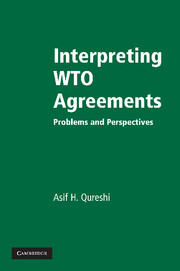Book contents
- Frontmatter
- Contents
- Preface
- List of Abbreviations
- Introduction
- 1 Interpreting principles of treaty interpretation in the WTO
- 2 Interpreting institutional aspects of the WTO Agreements
- 3 The national dimension to interpretation in the framework of the WTO
- 4 Interpreting exceptions in the WTO Agreements
- 5 Interpreting the WTO Agreements for the development objective
- 6 ‘Interpreting’ in external concerns
- 7 Interpreting the agreements on trade remedies
- Conclusion
- Annexes
- Index
4 - Interpreting exceptions in the WTO Agreements
Published online by Cambridge University Press: 23 February 2010
- Frontmatter
- Contents
- Preface
- List of Abbreviations
- Introduction
- 1 Interpreting principles of treaty interpretation in the WTO
- 2 Interpreting institutional aspects of the WTO Agreements
- 3 The national dimension to interpretation in the framework of the WTO
- 4 Interpreting exceptions in the WTO Agreements
- 5 Interpreting the WTO Agreements for the development objective
- 6 ‘Interpreting’ in external concerns
- 7 Interpreting the agreements on trade remedies
- Conclusion
- Annexes
- Index
Summary
Introduction
There has to be a theory for interpreting exceptions to a rule in international agreements – and in the WTO Agreements in particular, given that they are frequently invoked, encapsulate vital sovereign interests, and their characterisation, along with their interpretation, has serious consequences for the outcomes of decisions. The need for exceptions is grounded in reason, balance, measure, logic and coherence. Thus, rationality involves being open to exceptions, and the logic of a rule invites giving it clear boundaries as much as reinforcement from exceptions. It is this grounding of exceptions that calls for a theory of interpreting them – one that reflects their role in the scheme of a rule. By the same token, identifying exceptions and their scope through the interpretative process under international law must involve decision- makers in the judicial organs of the WTO in conceptions of justice compelling exceptions and economic analysis reinforcing WTO tenets. Similarly, democratic processes defined in terms of facilitating maximum participation and all-encompassing engagement with diverse interests push for a conscious approach to exceptions. If international agreements are the composite of the will of the majority, exceptions in some measure champion minority rights and divergent interests.
More particularly, in legal analysis there are a number of reasons for the importance of exceptions. First, the onus of proving an exception rests on the party invoking it. Second, in national practice exceptions are subject to a strict interpretation. Third, for an international agreement, the precise placement of a particular goal within a rule/ exception model has a bearing on how the agreement is interpreted.
- Type
- Chapter
- Information
- Interpreting WTO AgreementsProblems and Perspectives, pp. 87 - 113Publisher: Cambridge University PressPrint publication year: 2006



